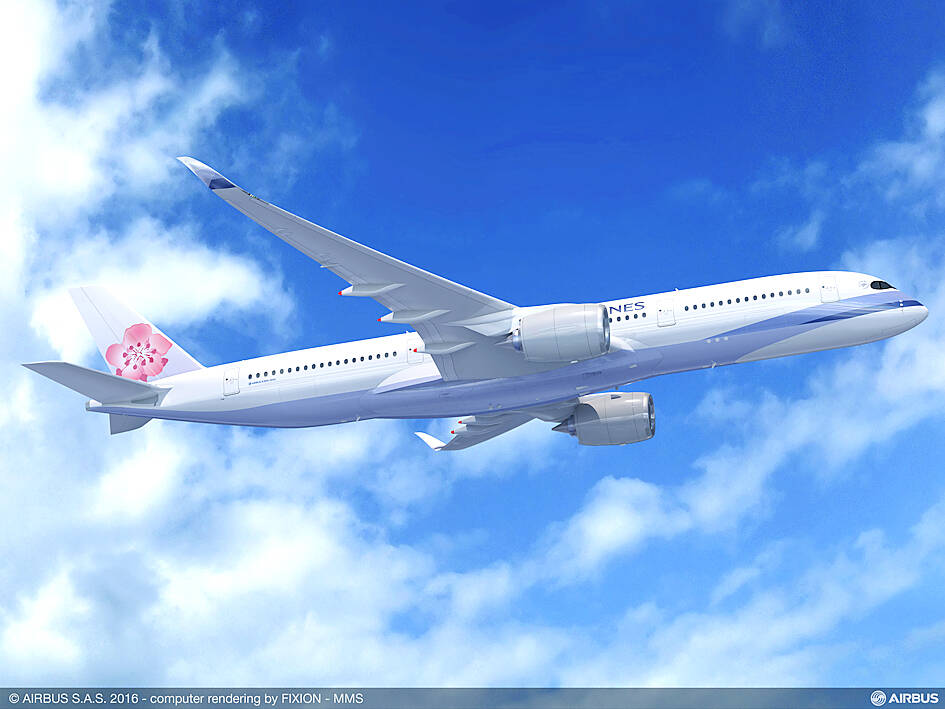The ongoing strike at Boeing Co has had only a minor impact on China Airlines Ltd (CAL, 中華航空), although the delivery of a new cargo jet might be postponed, CAL chairman Hsieh Su-chien (謝世謙) said on Saturday.
The 24 Boeing 787-9 passenger aircraft on order would be delivered on schedule from next year to 2028, while one 777F freight aircraft would be delayed, Hsieh told reporters at a company event.
Boeing, which announced a decision on Friday to cut 17,000 jobs — about one-tenth of its workforce — is facing a strike by 33,000 US west coast workers that has halted production of its 737 MAX, 767 and 777 jets.

Photo courtesy of China Airlines Ltd
The downsizing is necessary “to align with our financial reality,” Boeing chief executive officer Kelly Ortberg said in a message to employees on Friday, as the company also struggles with growing concerns over the quality of its aircraft.
The aviation giant announced a series of belt-tightening measures and production delays as the one-month-long strike of 33,000 workers has added to the company’s litany of problems.
Boeing staff with the International Association of Machinists (IAM) and Aerospace Workers walked off the job on Sept. 13 after overwhelmingly rejecting a contract offer.
The company said the IAM strike contributed to US$3 billion in pre-tax charges to its commercial aviation results in the third quarter, part of an anticipated loss of US$9.97 per share.
Ratings agency S&P estimated last week that the strike was costing Boeing US$1 billion per month.
However, Hsieh said that Boeing has confirmed that the 787-9 production line is unaffected, as its North Charleston, South Carolina facility has no union presence.
CAL has introduced six 777F freighters since December 2020, followed by the purchase of four more in January 2022.
Nine of the aircraft have been delivered so far, but the 10th, originally scheduled for delivery in August this year, has been delayed, with the new timeline yet to be determined, Hsieh said.
CAL’s revenue rose 7.4 percent year-on-year to NT$16.01 billion (US$497.5 million) last month, as its passenger revenue grew 2.41 percent to NT$9.45 billion and cargo revenue also increased 13.42 percent to NT$5.27 billion, the company reported on Friday.
In the third quarter, revenue rose 9.3 percent from a year earlier to NT$52.1 billion, the highest for the July-to-September quarter in the company’s history, it said.
Cumulative revenue in the first three quarters of the year was NT$150.98 billion, up 9.76 percent annually and the highest for the period, company data showed.
Additional reporting by AFP

When an apartment comes up for rent in Germany’s big cities, hundreds of prospective tenants often queue down the street to view it, but the acute shortage of affordable housing is getting scant attention ahead of today’s snap general election. “Housing is one of the main problems for people, but nobody talks about it, nobody takes it seriously,” said Andreas Ibel, president of Build Europe, an association representing housing developers. Migration and the sluggish economy top the list of voters’ concerns, but analysts say housing policy fails to break through as returns on investment take time to register, making the

NOT TO WORRY: Some people are concerned funds might continue moving out of the country, but the central bank said financial account outflows are not unusual in Taiwan Taiwan’s outbound investments hit a new high last year due to investments made by contract chipmaker Taiwan Semiconductor Manufacturing Co (TSMC, 台積電) and other major manufacturers to boost global expansion, the central bank said on Thursday. The net increase in outbound investments last year reached a record US$21.05 billion, while the net increase in outbound investments by Taiwanese residents reached a record US$31.98 billion, central bank data showed. Chen Fei-wen (陳斐紋), deputy director of the central bank’s Department of Economic Research, said the increase was largely due to TSMC’s efforts to expand production in the US and Japan. Investments by Vanguard International

WARNING SHOT: The US president has threatened to impose 25 percent tariffs on all imported vehicles, and similar or higher duties on pharmaceuticals and semiconductors US President Donald Trump on Wednesday suggested that a trade deal with China was “possible” — a key target in the US leader’s tariffs policy. The US in 2020 had already agreed to “a great trade deal with China” and a new deal was “possible,” Trump said. Trump said he expected Chinese President Xi Jinping (習近平) to visit the US, without giving a timeline for his trip. Trump also said that he was talking to China about TikTok, as the US seeks to broker a sale of the popular app owned by Chinese firm ByteDance Ltd (字節跳動). Trump last week said that he had

STRUGGLING TO SURVIVE: The group is proposing a consortium of investors, with Tesla as the largest backer, and possibly a minority investment by Hon Hai Precision Nissan Motor Co shares jumped after the Financial Times reported that a high-level Japanese group has drawn up plans to seek investment from Elon Musk’s Tesla Inc to aid the struggling automaker. The group believes the electric vehicle (EV) maker is interested in acquiring Nissan’s plants in the US, the newspaper reported, citing people it did not identify. The proposal envisions a consortium of investors, with Tesla as the largest backer, but also includes the possibility of a minority investment by Hon Hai Precision Industry Co (鴻海精密) to prevent a full takeover by the Apple supplier, the report said. The group is